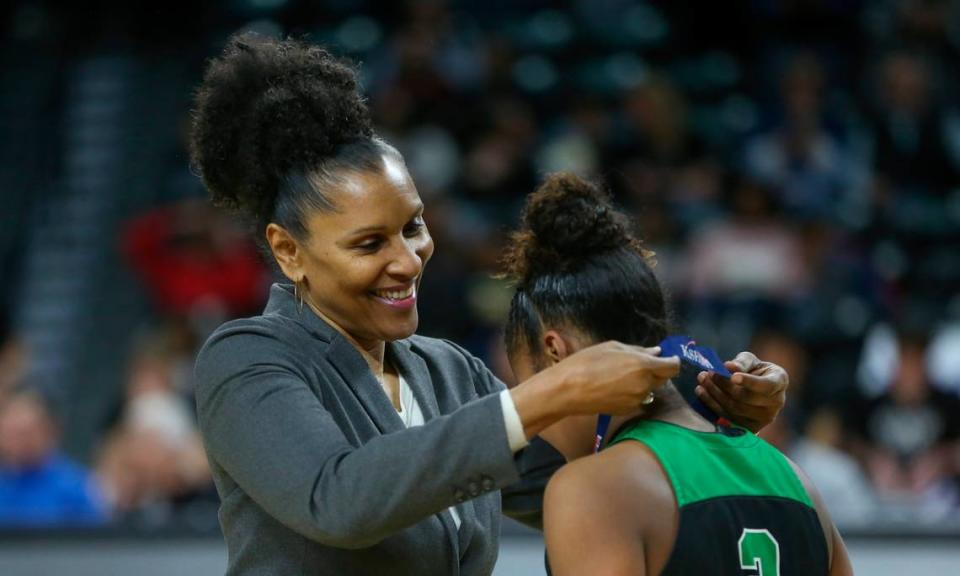Caitlin Clark embraced this former KU star. A shame the reply struck a different tone

You know, Lynette Woodard has a point.
But what a time to make it.
On a weekend more people watched women’s college basketball than, well, ever, Woodard argued that a primary reason for the large audience — Iowa star Caitlin Clark — needs an asterisk by her scoring record.
Those weren’t her exact words, but that’s precisely what she was suggesting.
Woodard, a pioneer of the game who set the women’s all-time scoring record while at the University of Kansas from 1977-81, said — a day before the NCAA national championship game — that she believes she remains the true owner of that record.
The crux of her argument is no longer that she scored more points than Clark before the NCAA oversaw women’s sports — a completely valid case that even Iowa coach Lisa Bluder made back when it was accurate earlier this year — but rather the respective manner in which she and Clark scored those points.
“I’ll just go ahead and get the elephant out of the room — I don’t think my record has been broken, because you can’t duplicate what you’re not duplicating,” Woodard told those in attendance at the Women’s Basketball Coaches Association in Cleveland, referring to her record as “hidden from everyone” for 43 years. “Unless you come with a men’s basketball and a 2-point shot, hey, you know.”
“You can help me spread that word,” she added.
She might be right, come to think of it. But isn’t it pretty hard to compare eras in any sport? Baseball lowered its mound and extended its season. Football bent its rules to aid quarterbacks and offenses. Basketball adopted the 3-point line.
But, well, what are we even doing? The points aren’t the point.
Women’s basketball has never before received this kind of deserved promotion — an overdue and momentous opportunity for a brighter future. But so much of the surrounding noise seems to have the opposite objective: demotion.
That’s not just a reference to the comments from Woodard, which she attempted to walk back on social media 24 hours later. It’s also a reference to the male talking heads who are unworthy of mention by name here (and those with political takes that are equally unworthy of specific mention).
Look, it has to be frustrating for Woodard, certainly, that Clark reached 3,951 career points during Iowa’s loss to South Carolina in the national championship game on Sunday. That 302 more than the 3,649 Woodard scored for KU, and Clark had the advantage of the 3-pointer.
The Hawkeyes superstar made 548 threes during her career. Woodard made zero.
It has to be just as frustrating to Woodard that Clark has played with a spotlight that was purposefully and embarrassingly denied Woodard and those of her era.
But the root of Woodard’s unprompted remarks — that’s a key point here, as she was not responding with honesty to a question, but rather eager to voice this take — is that her record was hidden for four decades.
So the solution is to, uh, hide Clark’s record now, too?
For what purpose?
It was a terrific weekend for women’s college basketball. The Final Four and championship game were the best arguments that the sport should have received this kind of TV exposure long before Clark came along. Like, you know, back when Woodard played.
This season revealed the greatness of the sport. Why hide any aspect of that now?
Whatever you think of Clark and her place in women’s basketball history, we can all agree that she is as responsible as anyone in recent memory for bringing the game a larger audience. Heck, indirectly, Clark’s ascendance has also connected Woodard’s accomplishments to a larger audience — maybe even bigger than when she was playing.
It’s unfortunate that’s true, no doubt. But Iowa embraced this by inviting Woodard to Clark’s senior day game, and Woodard embraced it by traveling to Iowa City for a gracious pass-the-torch scene complete with a standing ovation.
The sport needs more of those moments.
This season could supply a foundation, and South Carolina coach Dawn Staley is every bit the piece of that foundation that Clark is. Woodard is proof that the game has long needed that foundation — it’s disappointing how many learned her name for the first time through the accomplishment of a player 43 years later.
Clark isn’t the first great or even transformational women’s basketball player. She won’t be the last, either.
But the game will look different because of her four years at Iowa, same as it looked different after Woodard finished her career at KU. The hope is that more will be watching now — that TV executives will ensure it.
Clark might be headed to the WNBA, but Staley is one of the game’s best ambassadors. She’s not the only one, but she’s long understood that part of the bigger picture is a growing picture.
On Sunday, after capping a perfect 38-0 season, Staley and South Carolina celebrated on the makeshift stage at center court in Cleveland. At the conclusion of her live interview, she requested one final comment as part of her victory speech.
“I want to personally thank Caitlin Clark for lifting up our sport,” Staley said. “She carried a heavy load for our sport, and it just is not gonna stop here on a collegiate tour.
“But when she is the No. 1 in the WNBA Draft, she’s going to lift that league up, as well. So, Caitlin Clark, if you’re out there, you are one of the GOATs of our game, and we appreciate you.”

